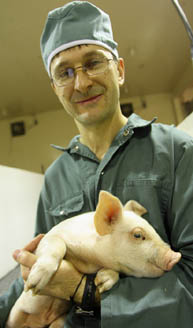Cloned pigs a first in Canada
Genetically identical offspring to aid in research into human disease

Dr Vilceu Bordignon and porcine friend.
Owen Egan
First came Dolly, the world's first cloned sheep, born in Scotland more than a decade ago. Now, researchers in McGill's Department of Animal Science have used the same technology to produce Canada's first cloned pigs.
"We started the procedure a year ago and the pigs are now developing normally," said Dr Vilceu Bordignon, director of the Large Animal Research Unit at McGill's Macdonald Campus in Ste. Anne de Bellevue.
Three litters were born Oct. 22, Nov. 6 and Nov. 12, after Bordignon and his team first collected cells from a male pig, cultured the cells in vitro and then injected them into matured female germ cells. Embryos developed in the lab were then inserted into three female pigs.
The project produced 17 piglets, seven of which were euthanized and autopsied to determine any abnormalities as a result of the cloning. The remaining 10, now several weeks old, will eventually be used in biomedical research to help develop treatments for human diseases such as diabetes and cardiovascular disease.
"After monkeys, pigs are the best animal models to use in research because of their physiology, which is quite similar to our own," explained Bordignon.
"Because we are the first in Canada, I've already been contacted by researchers from McGill and other Canadian universities interested in developing specific animal cells to study a variety of human diseases," Dr Bordignon said.
He said staff at the Large Animal Research Unit has been monitoring the piglets' growth rate and have observed no abnormalities.
"With cloning, it's nearer the time of birth when we see abnormalities," he said. "Now, the pigs are 10 times the size they were at birth. They are feeding, growing and developing just like normal pigs."
Dolly the sheep was euthanized in 2003 after contracting lung disease and arthritis. Scientists at the Roslin Institute in Edinburgh, Scotland, where Dolly was born, said at the time that her sickness was unrelated to the fact that she was a clone.
Bordignon pointed out that pigs were first successfully cloned in the United States in 2000, have also been cloned in Finland, and have been used regularly in biomedical research ever since.
"There's a huge advantage to using cloned animals because the cells can be so easily manipulated in vitro," he said, adding the long-term goal is to produce a line of stem cells that could lead to the development of new cell therapies to treat a variety of human ailments.
Funding for the $1 million cloning program was provided by the Natural Sciences and Engineering Research Council of Canada (NSERC), the Canada Foundation for Innovation (CFI), Le Fonds québécois de la recherche sur la nature et les technologies (FQRNT) and McGill University.

